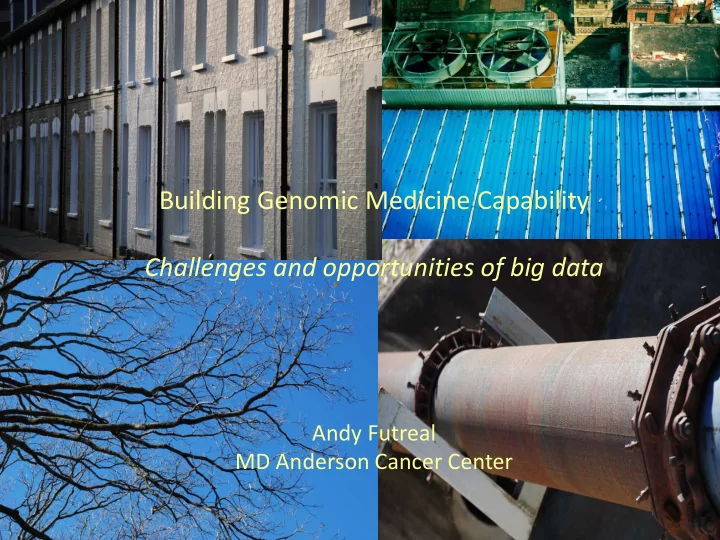

Building Genomic Medicine Capability Challenges and opportunities of big data Andy Futreal MD Anderson Cancer Center
Personalised/Stratified/Precision Medicine for Cancer Personalised medicine will enable the much needed paradigm shift in clinical care delivery, but we will need appropriate tools & know-how to realize the model and implement the vision Clinical Right Patient Success Right Drug Rx Right Target Drug Biomarker- Molecular Profiling Assays MOA Biology Validation How to accelerate this paradigm? Patient Omics 2
Moonshots • The selected cancers are: • Triple Negative Breast Cancer • High-grade Serous Ovarian Cancer • Leukemia (AML/MDS) • Leukemia (CLL) • Lung • Melanoma • Prostate • Focus on patient impact and reduction in mortality world-wide • Comprehensive, spanning the cancer care continuum • Collaborative, internal and external • Innovative, in organizational constructs and technology 3
Moonshot Platforms • Center for Co-clinical trials • Institute for Personalised Cancer therapy • Cancer Control • Early detection/Diagnostics • Clinical Genomics • Immunology • Institute for Applied Cancer Sciences • Translational Research Continuum • Research Genomics/Informatics • Big Data • Adaptive Learning 4
Adaptive Learning in Genomic Medicine Consent, Biospecimen Collection, QC, Banking , Biomolecule Processing Clinical information and tests Research Data: Omic profiling; Integrated Patient Data Warehouse Systems Pharm; Preclinical Rx- TRC; Treatment Decisions & TCGA/ICGC Massive Data Analytics Pubmed Response Big-Data Analytics Patent db Assessment Social media Other Research & Decision Big Data Environment Operations Support
Big (well, it is Texas after all) Data Analytics FIR
Leukemia Project • 1000 leukemia patients by fall 2013– MDS/AML/CLL focus • Focused on but not limited to newly diagnosed patients • Samples taken at diagnoses/presentation and thereafter at each patient visit. • Saliva/buccal for normal, bone marrow and/or peripheral blood • Bone marrow/bloods accessed in context of normal clinical workup/care • All samples collected and held in CLIA compliant chain of custody 7
Leukemia Project • Exome sequencing, low-pass WGS • Data generated on normal/tumor (presentation) and from relapse sample(s) • All clinical data currently collected in Departmental database plus extraction from patient records • A few early potential questions – – MDS to AML progression – risk of death during induction chemotherapy – subclonality and risk of relapse/progression
• Other Opportunities (some of them) – Genetic/genomic heterogeneity – Comprehensive cancer patient genomics – • Interplay of germline and somatic genomics in the same patient – Impact of genomics on outcomes • adverse events • survivorship 9
The H word • Genetic heterogeneity is a key determinate of variation in outcomes – What are the cancer genes operative? – What is the level of intra-tumor heterogeneity? – What are the germline/somatic sequence variants that are influencing factors including: • Drug metablolism • Immune response • Cancer susceptiblity • Toxicity – How do these factors interact and influence outcomes?
Comprehensive Cancer Patient genomics a tale of (at least!) two genomes Somatic Risk and response to exposure: Tobacco, UV radiation, diet, stress Germline Treatment: Response, acute toxicity, resistance Survivorship: Long term toxicity, recurrence, second primary cancers
Adaptive Learning/Leukemia Team Lynda Chin Hagop Kantarjian John Frenzel Guillermo Garcia-Manero Keith Perry Michael Keating Brett Smith Bill Wierda Raja Luthra Steve Kornblau Craig Owen Brian Lari John Zhang Alexei Protopopov 12
Recommend
More recommend